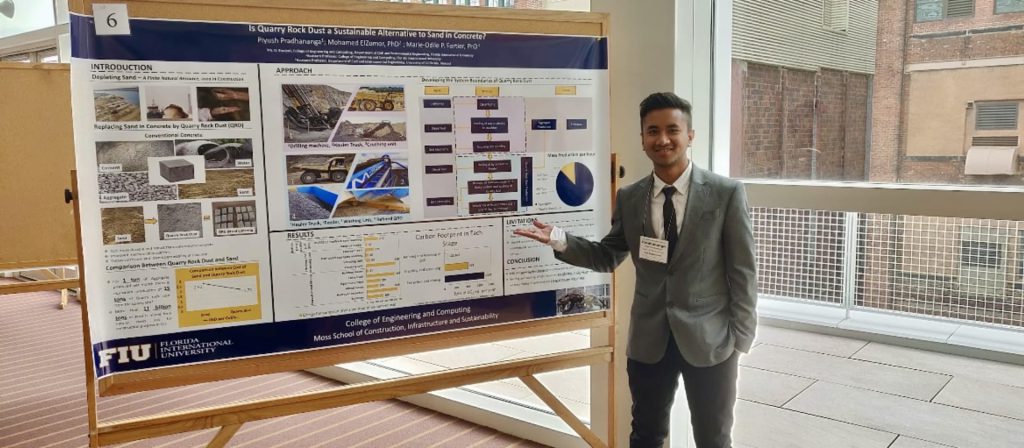Originally written on December 4, 2024 on news.fiu.edu.
Written by Irene Ferradaz
Piyush Pradhananga remembers the aftermath of an earthquake that flattened his town in Nepal, one of the world’s most natural disaster-prone countries, when he was in his early 20s. Aside from the pain his family and many others suffered, something else left an impression: the amount of debris created in the demolition of homes slated for reconstruction.
Awarded a Ph.D. in 2023 from the Department of Civil and Environmental Engineering within FIU’s College of Engineering & Computing, Pradhananga could not shake the idea of helping low-income communities recover from earthquakes, flooding and windstorms in a way that would reduce both costs and waste. He undertook research that would help identify elements – such as windows, doors, rooftops, stairs and flooring – that could be reused in either new construction or remodeling.
“My doctoral studies have provided me with the opportunity to engage in cutting-edge research projects such as revamping circular economy resilience in construction, accelerating effective project delivery of U.S. bridges and advancing construction students’ technological skills that required collaboration across multiple disciplines,” says Pradhananga. “This challenged me to think beyond the boundaries of my primary field and encouraged me to explore connections and synergies with other academic fields, such as business, data analytics, environmental safety and sustainability to give me a more well-rounded perspective.”
During his studies, Pradhananga realized that if he wanted to translate his research of sustainable, affordable construction materials to create a real-world impact, he would need the help of StartUP FIU, the university’s dedicated innovation hub.
First introduced to StartUP FIU during a workshop held at the College of Engineering& Computing, Pradhananga was immediately intrigued by the social entrepreneurship and innovative concepts being taught.
“They understood my passion for bringing eco-friendly, safe and affordable building materials to underserved communities,” says Pradhananga, who credits StartUP FIU with helping unlock his interest in entrepreneurship.
Eager to see his years of construction research come to life, Pradhananga created a startup – Eco-Friendly Disaster Recovery (EDR) – that uses dedicated technology to determine which building components can be repurposed safely and successfully during deconstruction.
To understand whether a component can be reused or recycled, Pradhananga relies on data such as the type of material of which it is made (wood, steel, concrete, etc.), its structural integrity and projected lifespan and the ability of the component to be transported to a new location and work with other materials and components on site.
Once all factors are weighed, Pradhananga’ s software determines a deconstruction feasibility score, which informs his decision regarding which components can be reused and which must be placed in a landfill. The goal is to ensure that all repurposed components are safe to use, whether that be as part of rebuilding in the aftermath of a natural disaster or simply remodeling a home.
To ensure that different materials or components meet the industry standards, Pradhananga’s software also estimates the “salvage performance” of materials. This ensures professionals can retrofit the recovered components in a timely manner before use.
“The long-term goal of my startup is to provide easy access to reusable or recyclable building components for low-income housing construction in first world countries, developing nations and, especially, poorer countries, where building materials are not affordable for disaster-prone communities,” says Pradhananga.
Additionally, he hopes that his innovative technology will positively impact homeless individuals by improving accessibility to affordable and sustainable materials.
“Dr. Pradhananga’s exploration of sustainable materials and the reuse of building resources is the kind of forward thinking, future-ready mindset we nurture at StartUP FIU,” says Robert Hacker, director and co-founder of StartUP FIU and Pradhananga’s mentor. “As FIU researchers continue tackling our world’s toughest challenges, it’s up to places like StartUP FIU to help them recognize the significant societal value of their innovations and encourage them to translate their findings for the good of all.”
One of the chief social values of using the building deconstruction approach is its reduced environmental impact. The reuse or recycling of building materials results in approximately 32 million tons of waste annually being diverted.
Moreover, according to data published by United Nations Environmental Program, utilizing a building deconstruction approach will help to generate 50 to 75 percent fewer emissions in comparison to new construction.
In addition to encouraging Pradhananga’s vision for a more sustainable and affordable construction industry, StartUP FIU provided personalized mentorship and entrepreneurial advice, introducing him to a number of grants and other seed funding opportunities to help translate his research.
“They helped me understand the importance of visibility, viability and desirability of my startup idea,” says Pradhananga.
Pradhananga won a micro grant for $600 from MITSolved to develop a prototype for his startup and was awarded $50,000 from the National Science Foundation’s I-Corp program for customer discovery. As part of the I-Corps program, Pradhananga interviewed 110 customers in seven weeks, learning their pain points and better understanding the market need for his eco-friendly, affordable building materials.
Moving forward, Pradhananga plans to apply for a Small Business Innovation Research (SBIR) grant. Such funding will help Pradhananga continue researching and developing his technology, allow for the building of advanced prototypes and encourage potential partners to join him in the the commercialization phase.
“StartUP FIU has helped me refine my proposals to be more impactful and concise, provided me with invaluable feedback regarding my startup idea and has improved my confidence,” says Pradhananga. “I’ve learned so many business concepts, I feel like I’ve completed an MBA!”

